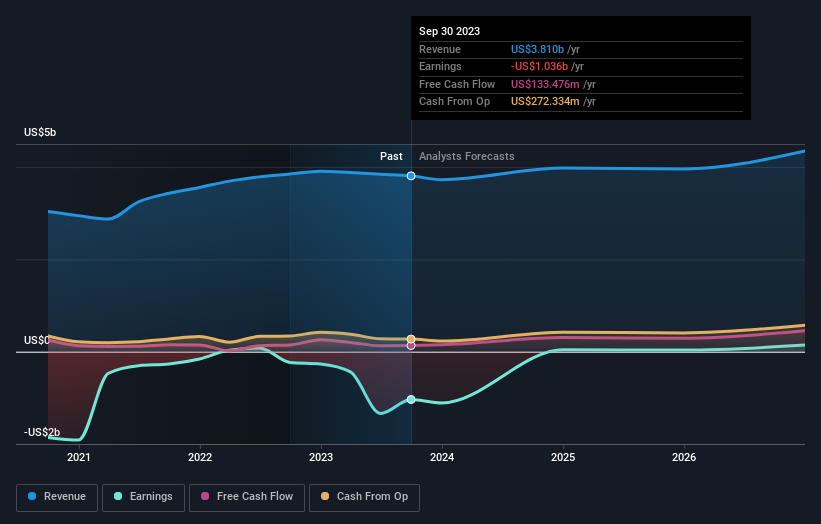Please use a PC Browser to access Register-Tadawul
Institutional owners may take dramatic actions as iHeartMedia, Inc.'s (NASDAQ:IHRT) recent 16% drop adds to one-year losses
IHEARTMEDIA INC IHRT | 0.00 |
Key Insights
- Significantly high institutional ownership implies iHeartMedia's stock price is sensitive to their trading actions
- A total of 7 investors have a majority stake in the company with 50% ownership
- Insiders have been buying lately
To get a sense of who is truly in control of iHeartMedia, Inc. (NASDAQ:IHRT), it is important to understand the ownership structure of the business. With 76% stake, institutions possess the maximum shares in the company. That is, the group stands to benefit the most if the stock rises (or lose the most if there is a downturn).
And so it follows that institutional investors was the group most impacted after the company's market cap fell to US$359m last week after a 16% drop in the share price. Needless to say, the recent loss which further adds to the one-year loss to shareholders of 67% might not go down well especially with this category of shareholders. Also referred to as "smart money", institutions have a lot of sway over how a stock's price moves. Hence, if weakness in iHeartMedia's share price continues, institutional investors may feel compelled to sell the stock, which might not be ideal for individual investors.
Let's delve deeper into each type of owner of iHeartMedia, beginning with the chart below.
See our latest analysis for iHeartMedia

What Does The Institutional Ownership Tell Us About iHeartMedia?
Institutional investors commonly compare their own returns to the returns of a commonly followed index. So they generally do consider buying larger companies that are included in the relevant benchmark index.
As you can see, institutional investors have a fair amount of stake in iHeartMedia. This implies the analysts working for those institutions have looked at the stock and they like it. But just like anyone else, they could be wrong. It is not uncommon to see a big share price drop if two large institutional investors try to sell out of a stock at the same time. So it is worth checking the past earnings trajectory of iHeartMedia, (below). Of course, keep in mind that there are other factors to consider, too.

Institutional investors own over 50% of the company, so together than can probably strongly influence board decisions. We note that hedge funds don't have a meaningful investment in iHeartMedia. Looking at our data, we can see that the largest shareholder is Pacific Investment Management Company LLC with 17% of shares outstanding. In comparison, the second and third largest shareholders hold about 12% and 5.6% of the stock. Additionally, the company's CEO Robert Pittman directly holds 1.0% of the total shares outstanding.
On further inspection, we found that more than half the company's shares are owned by the top 7 shareholders, suggesting that the interests of the larger shareholders are balanced out to an extent by the smaller ones.
While it makes sense to study institutional ownership data for a company, it also makes sense to study analyst sentiments to know which way the wind is blowing. There are a reasonable number of analysts covering the stock, so it might be useful to find out their aggregate view on the future.
Insider Ownership Of iHeartMedia
The definition of an insider can differ slightly between different countries, but members of the board of directors always count. The company management answer to the board and the latter should represent the interests of shareholders. Notably, sometimes top-level managers are on the board themselves.
Most consider insider ownership a positive because it can indicate the board is well aligned with other shareholders. However, on some occasions too much power is concentrated within this group.
We can report that insiders do own shares in iHeartMedia, Inc.. As individuals, the insiders collectively own US$7.8m worth of the US$359m company. Some would say this shows alignment of interests between shareholders and the board. But it might be worth checking if those insiders have been selling.
General Public Ownership
The general public-- including retail investors -- own 22% stake in the company, and hence can't easily be ignored. This size of ownership, while considerable, may not be enough to change company policy if the decision is not in sync with other large shareholders.
Next Steps:
While it is well worth considering the different groups that own a company, there are other factors that are even more important. Case in point: We've spotted 3 warning signs for iHeartMedia you should be aware of, and 2 of them are concerning.
But ultimately it is the future, not the past, that will determine how well the owners of this business will do. Therefore we think it advisable to take a look at this free report showing whether analysts are predicting a brighter future.
NB: Figures in this article are calculated using data from the last twelve months, which refer to the 12-month period ending on the last date of the month the financial statement is dated. This may not be consistent with full year annual report figures.
This article by Simply Wall St is general in nature. We provide commentary based on historical data and analyst forecasts only using an unbiased methodology and our articles are not intended to be financial advice. It does not constitute a recommendation to buy or sell any stock, and does not take account of your objectives, or your financial situation. We aim to bring you long-term focused analysis driven by fundamental data. Note that our analysis may not factor in the latest price-sensitive company announcements or qualitative material. Simply Wall St has no position in any stocks mentioned.



